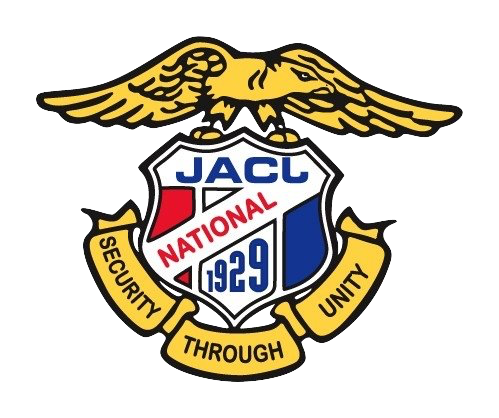JACL In Selma: Reflections from Turnaround Saturday
JACL is in Selma, Alabama this weekend to commemorate the 50th Anniversary of the 1965 voting rights demonstrations and marches that led to the passage of the landmark Voting Rights Act. The JACL delegation is attending the events with Todd Endo, a longtime JACLer who participated in the demonstrations in 1965 and covered the events in a series of articles for the Pacific Citizen Newspaper.
Ryan Kenji Kuramitsu and Kota Mizutani at the SPLC Civil Rights Memorial in Montgomery, AL
By Kota Mizutani and Ryan Kenji Kuramitsu
We didn’t make it to all the way there today. Knowing the long drive we had ahead of us, our eager delegation stopped for road trip supplies before departing Montgomery for our goal: Selma. With bottles of water and a deep feeling of excitement, we drove along the same road that the 1965 Civil Rights marchers had traversed 50 years before. As we made a laughter and conversation-filled drive, we passed by a sizable National Park Service civil rights museum and a sign marking “Tent City.” We wondered, as we continued on, how the landmark got its name.
Soon after, we joined the throng of other vehicles making the same journey to Selma and became solidly stuck in traffic. By that time it became clear, much to our dismay, that with the traffic and tight schedule of events, it simply would not make sense for us to continue on to attend the President’s speech in Selma. Disappointed, but promising to return tomorrow, we turned back for Montgomery.
As we headed back on the same road, we decided to stop by the National Park Service museum and “Tent City.” There, we saw an emotionally moving exhibit on the history of “Bloody Lowndes County,” where the museum is housed, and on the history of Dr. King’s march – the women and men who participated, and the incredible sacrifices they made. Powerful images abounded: grainy pictures of a black woman solemnly gazing at the barely noticeable outlines of two lynched black men, the ghastly uniform of the Alabama state troopers who beat protesters bloody, and replicas of the vulnerable makeshift encampments where marchers stopped to rest on their journey, where they were forced to live in impromptu communities after whites retaliated with evictions following the march (hence the name “Tent City”). These stories reminded us of the pain and bravery that underscored the historic march from Selma and Montgomery, and our own road trip from Montgomery to Selma.
After this, we happened across the former mayor of the city and director of SNCC’s Alabama operations outside of a local grocery store. As we munched on familiar snack – spam, ramen, and chips – he recalled the brutal murders of marchers both black and white, and paralleled the struggle of the march to current fights for peace in a world of constant unjust conflict and violence. We shortly returned to the National Park Service museum where we sat in an intimate theatre next to black, Asian, and white folks, and watched a livestream of the President’s speech as he outlined the significance of the 1965 March and compared it directly to the America we live in today. We were thrilled to hear President Obama note that alongside blacks and Latinos and Native Americans, Asian Americans also struggle, and have always struggled, to realize the American dream – a land where all are truly equal.
Still teeming with energy from the President’s remarks, we left Tent City and arrived back in Montgomery to visit the many landmarks there, including the Civil Rights Memorial and Dexter Street Baptist Church, where Dr. King served as a pastor for several years.
We didn’t make it to Selma today. We did not reach our final goal – nor have we, as President Obama’s message reminded us, reached our final destination when it comes to social justice. As we have more miles to travel to get to Selma tomorrow, so too do we have much more work to tackle in the realm of achieving full equality in this country. Our own version of “Turnaround Tuesday” today allowed us to further digest our place in the long history of struggle for civil liberties in America.
Thus, today was, in many senses, a preparation. Our many unplanned, yet remarkable encounters today prepared us for both the reenactment of the 1965 March tomorrow and for the immense responsibility and solidarity that we must continue to carry on in order to realize the dream of these early martyrs and heroes, whom we remember this weekend. Tomorrow we will get all the way Selma. And in the many tomorrows to come, we will continue to march in solidarity for transformative justice and racial equality.
From Left: Lily Endo, Aidan Endo, Kota Mizutani, Korinne Sugasawara, and Ryan Kenji Kuramitsu with a National Park Service Ranger at the Selma to Montgomery National Historic Trail visitors center in Lowndes County, AL.


